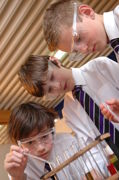- Home
- Curriculum
- Subject Information
- Chemistry
Chemistry
Overview
Miss S. Difford - Head of Chemistry
 Chemistry is the science of matter at the very basic level of molecules and atoms. Chemists study what substances are made of, how they interact and their role in living things. Studying Chemistry means learning to understand the basic properties of matter and to predict and explain how they change when they react to form new substances.
Chemistry is the science of matter at the very basic level of molecules and atoms. Chemists study what substances are made of, how they interact and their role in living things. Studying Chemistry means learning to understand the basic properties of matter and to predict and explain how they change when they react to form new substances.
Over the past 100 years, chemistry has transformed and improved our lives. Without our increased knowledge of chemistry, there would be no inorganic fertilisers (80% of the world would starve), no purified water, no aspirin, paracetamol or ibuprofen, no penicillin or other antibiotics, no anaesthetic, no adhesives and no house paint. More recently, chemistry research has led to the development of flat screens, smaller mobile phones (by improving battery technology) and scratch-resistant materials.
A variety of different teaching methods and resources is employed to deliver the curriculum. However, the emphasis is very much on the development of chemical knowledge through carrying out experiments. As well as practical knowledge of the subject, chemistry students develop many other skills such as problem solving, numeracy, communication and data analysis. Chemistry is not limited to beakers and laboratories. It is all around us, and the more we understand chemistry, the better we know our world.
| The following links provide further information: |
|---|
Chemistry Curriculum Summaries
| KS3 | See Science (KS3) | ||
| KS4 | Year 9 | Year 10 | Year 11 |
| KS5 | Year 12 | Year 13 | |
Assessment Process
Chemistry Assessment and Feedback Process: Years 9 - 13
Wider reading suggestions for our Chemistry students



